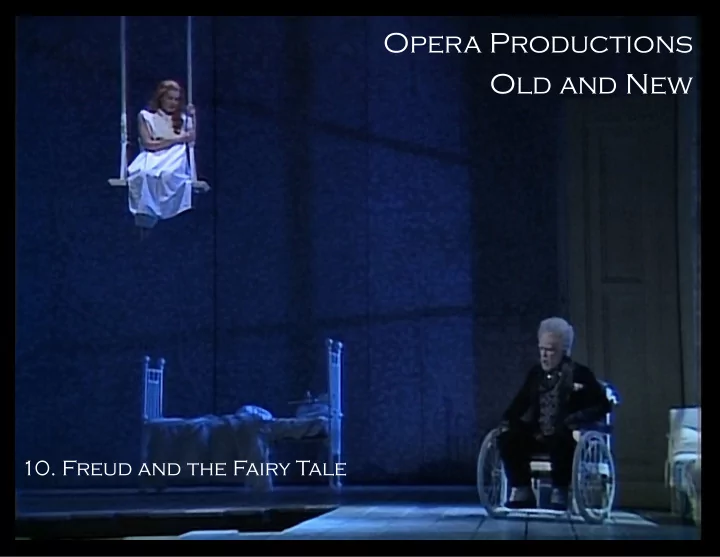

Opera Productions Old and New 10. Freud and the Fairy Tale
Shine down, O Moon, wherever my love may be. Tell him that I embrace him in my dreams! Shine on my Love, O Moon, wherever he may be. Tell him that I embrace him in my dreams!
Renée Fleming as Rusalka, Met 2012 Kristjne Opolais as Rusalka, Met 2017 Otuo Schenk director Mary Zimmerman director
My womanhood has been defiled. I am condemned to drag you down to the depths.
Dvorak: Rusalka . Productjon by David Pountney, ENO 1986.
A Victorian nursery. A young woman wakes from sleep, aware for the first time of her blos- soming sexuality. Meanwhile, her sisters continue to play the games of childhood.
Removed from the games of her sisters, Rusalka, both water nymph and young woman, tells her grandfather of her love for the Prince who comes to immerse herself in her waters, and of her desire to become human.
Heedless of the old man’s warnings, Rusalka prays to the moon to let the Prince know of her love, then consults the witch Jezibaba about entering the world of men.
Undisturbed by the Witch’s conditions — that she will lose her voice and never be able to return to her sisters — Rusalka drinks Jezibaba’s potion and meets her Prince.
The Prince takes Rusalka to his palace and treats her like a jewel. But he is frustrated by her apparent inability to return his passion. Meanwhile a Foreign Princess, a guest at the palace, complains of his neglect….
Courtiers array Rusalka for her wedding. But their song emphasizes the loss of her virginity.
The Prince succumbs to the Foreign Princess, then immediately thinks of Rusalka. It is too late. He is rejected by both women.
Unable to live without her, the Prince seeks Rusalka in the waters once more. Even knowing that it means his death, he begs her to kiss him and set him free.
Opera Productions Old and New 10. F 0. Fre reud and ud and t the F he Fair airy T y Tal ale
Dvorak: Rusalka Stefan Herheim, Brussels, 2008
Dvorak: Rusalka Martin Kusej, Munich, 2012 Rusalka: Kristjne Opolais
Kristjne Opolais as Rusalka Munich (lefu) and New York (below)
Dvorak: Rusalka Robert Carsen, Paris, 2002
Dvorak: Rusalka . Productjon by Robert Carsen, Paris 2002.
We begin in the underspace, below the world of men, where the Water Nymphs tease their father, the Water Goblin.
As Jezibaba performs her ritual that will make Rusalka human, the stage transforms and the mirror setting vanishes — for now.
Rusalka is now in her bedroom, putting on the silk dress that her Prince has left for her. He is eloquent in his ardor, but she is silent.
Dvorak opens Act II with a comic scene between the Servants, discussing this strange mute woman. Robert Carsen treats it as a new world of mirrors: image and reflection, but which side is Rusalka on?
The Prince is puzzled by Rusalka’s apparent inability to respond. Then the Foreign Princess enters on the other side of the mirror….
The Polonaise introducing the wedding guests is treated by Carsen and his choreographer Philippe Giraudeau as an allegory of the sexes.
The Act II finale pits the Prince and the Foreign Princess on one side of the mirror, against Rusalka and her Father, watching from the other.
Michael Levine’s set design for Act III includes another view of the wrecked bedroom, this time from above. But at the very end, we are returned to the pristine room as before, and Carsen seems to propose a variant on Dvorak’s tragic ending….
Opera Productions Old and New 10. Freud and the Fairy Tale
Recommend
More recommend